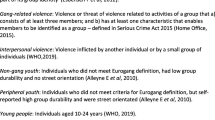Abstract
In this essay I examine some of the problems that prompted the National Research Council (NRC) report and consider how academic researchers might help resolve them. Many of the problems were found to be associated with research designed to assess program effects on child victimization and violence against women, areas in which research participation by subjects is particularly burdensome and difficult to obtain. Yet, program evaluations often assume that the process of subject participation is well understood and that outcome measures are reliable and valid across all subjects. A multidisciplinary, comprehensive and systematic review of victimization programs and past research is needed to advance the rigor of future evaluations. However, academics should not insist that all victim service programs warrant program evaluation as a condition of continued public support, because the decision to retain a program inevitably involves more than a scientific estimate of its effect.
Similar content being viewed by others
References
Bennett, L., Riger, S., Schewe, P., Howard, A., & Wasco, S. (2004). Effectiveness of hotline, advocacy, counseling, and shelter services for victims of domestic violence. Journal of Interpersonal Violence 19, 815–829.
Cook, T. D., & Campbell, D. T. (1990). Quasi-experimentation: Design and analysis issues for field settings, Boston: Houghton Mifflin
Groves, R., Dillman, D., Eltinge, J., & Little, R. (2002). Survey nonresponse. New York: Wiley
Kilpatrick, D., Beatty, D., & Howley, S. (1998). The rights of crime victims—does legal protection make a difference? Washington, DC: National Institute of Justice.
Moore, T., Rhatigan, D., Stuart, G., Street, A., & Farrell, L. (2004). Where to publish family violence research? Violence and Victims 19, 495–503.
Riger, S., Bennett, L., Wasco, S., Schewe, P., Frohman, L., & Camacho, J. (2002). Evaluation of services for survivors of domestic violence and sexual assault. Thousand Oaks, CA: Sage.
Sherman, L. (2003). Misleading evidence and evidence-led policy: Making social science more experimental. The Annals of the American Academy of Political and Social Science 589, 6–21.
Sherman, L., Gottfredson, D., MacKenzie, D., Eck, J., Reuter, P., & Bushway, S. (1997). Preventing crime: What works, what doesn’t, what’s promising: A report to the United States Congress. Washington, DC: National Institute of Justice.
US General Accounting Office (2001). Justice discretionary grants: Byrne programs and violence against women office grant monitoring should be better documented. Washington, DC: US Government Printing Office.
US General Accounting Office (2002). Justice impact evaluations: One Byrne evaluation was rigorous: All reviewed violence against women office evaluations were problematic. Washington, DC: US Government Printing Office.
US General Accounting Office (2003). Justice outcome evaluations: Design and implementation of studies require more NIJ attention. Washington, DC: US Government Printing Office.
Ybarra, L., & Lohr, S. (2002). Estimates of repeat victimization using the National Crime Victimization Survey. Journal of Quantitative Criminology 18, 1–21.
Author information
Authors and Affiliations
Corresponding author
Rights and permissions
About this article
Cite this article
Lauritsen, J.L. Assessing problematic research: How can academic researchers help improve the quality of anti-crime program evaluations?. J Exp Criminol 2, 363–373 (2006). https://doi.org/10.1007/s11292-006-9015-8
Published:
Issue Date:
DOI: https://doi.org/10.1007/s11292-006-9015-8



